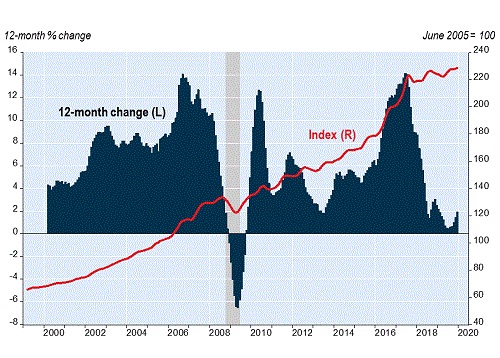

February 20, 2020
In January the Teranet–National Bank National Composite House Price Index™ edged up 0.1% from the previous month, a so-so showing for a month of January. In only three of the last 10 years (including last year) has the January change been lower. The composite index was braked this January by declines of the indexes for Quebec City (−1.4%), Calgary (−1.1%), Victoria (−0.8%), Winnipeg (−0.7%) and Halifax (−0.1%). The other six indexes were up: Edmonton 0.1%, Ottawa-Gatineau 0.1%, Toronto 0.2%, Vancouver 0.2%, Montreal 0.5% and Hamilton 0.8%.
The markets that appreciated most in the 12 months ending in January were all in eastern Canada – Ottawa-Gatineau 7.9%, Hamilton 6.7%, Montreal 6.7%, Halifax 6.4% and Toronto 4.5%. The resale markets in these urban areas are considered seller’s markets. Twelve-month growth was minimal in the indexes for Winnipeg (0.3%) and Victoria (0.3%), and negative in Edmonton (−0.1%), Quebec City (−1.2%), Calgary (−1.6%) and Vancouver (−3.6%). This last market has been improving recently; its index has shown no retreat in the last four months.

For the national composite index the gain from a year earlier was 2.1% in January, a sixth month of acceleration of the 12-month advance.
Besides the Toronto and Hamilton indexes included in the composite index, indexes exist for the seven other urban areas of the Golden Horseshoe. In general, the movement of these indexes over the 12-month period consisted of a slow start followed by a spectacular surge. The net rise from a year earlier was 8.3% for Guelph, 8.5% for Brantford, 8.4% for Kitchener, 7.0% for St. Catharines and 5.4% for Oshawa. Conversely, in Barrie (+4.6%) and Peterborough (+9.9%) the major part of the gain took place in the first half of the period.
Indexes not included in the composite index also exist for seven markets outside the Golden Horseshoe. Of the two in B.C., Abbotsford-Mission has been struggling and its index is down 3.8% from a year earlier, while Kelowna has been recovering for eight months and is up 4.8% from a year earlier. Of the five in Ontario, Thunder Bay (+4.8%) began the period strongly and then lost ground. The story was the opposite in the indexes for Windsor (+10.4%), London (+8.6%) and Kingston (+10.9%). Curiously, the 12-month rise of the index for Sudbury was concentrated mainly in May. For the full report, including historical data, please visit www.housepriceindex.ca.








